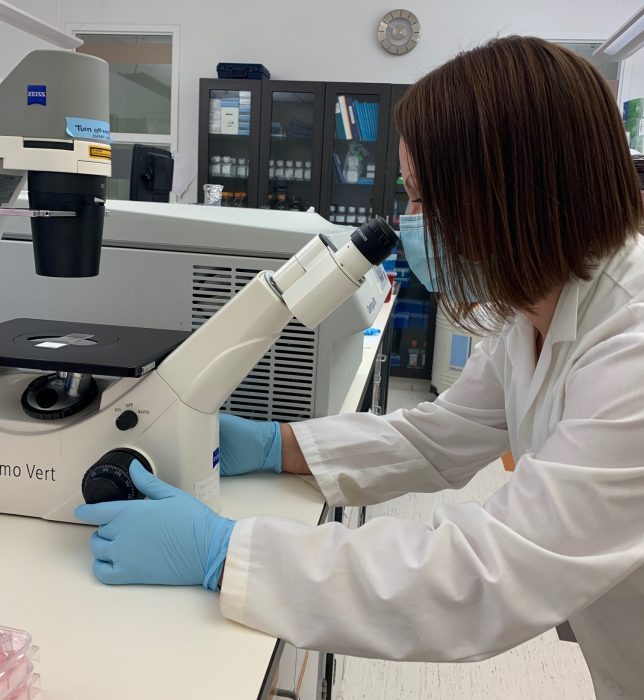
Dr. Devi Atukorallaya, an assistant professor of oral biology in the Dr. Gerald Niznick College of Dentistry, is happy to be back in her lab after the threat of COVID-19 forced her to close it in mid-march.
Scientists cautiously reopen labs on Bannatyne campus
The lights are back on in some of the labs and world-class experiments have resumed.
A number of Rady Faculty of Health Sciences researchers are back on the Bannatyne campus – specifically those who cannot work remotely and to a 50 per cent capacity of occupancy – after the threat of COVID-19 forced their labs to close in mid-march.
The first thing Dr. Devi Atukorallaya did when she received approval to return to campus in mid-June was visit her fish.
The assistant professor of oral biology in the Dr. Gerald Niznick College of Dentistry uses fish models in her work to understand the genetic basis of head and neck birth defects.
One of Atukorallaya’s main concerns while being away from her lab was the maintenance of her experimental animal models. However, the Mexican tetra and zebra fish were well looked after and she received regular updates about her colony from Central Animal Care Services (CACS) staff.
“The colony was very well maintained,” she said. “We are really grateful to the CACS because they did an exceptional job.”
While Atukorallaya is happy to be back in her lab she said it took a bit of time to get used to the new safety protocols.

Dr. Tamra Werbowetski-Ogilvie, an associate professor of biochemistry and medical genetics in the Max Rady College of Medicine and a Canada Research Chair in neuro-oncology and human stem cells, now wears a mask in her lab.
Those working in labs are encouraged to wear a mask at all times, but only required to do so when social distancing is not possible. Everyone in labs is required to sanitize or wash their hands, keep two-meters apart and disinfect areas and equipment before and after using. The number of people allowed in the labs has also been reduced.
“It’s the new norm,” Atukorallaya said. “I respect these measures because they’re necessary. This is how Manitoba has controlled this disease.”
Dr. Dake Qi, an assistant professor in the College of Pharmacy, couldn’t wait to return to the lab.
“We are very happy to come back to work,” said Qi, whose research focuses on a protein molecule called macrophage migration inhibitory factor that plays a key role in regulating many diseases. “We are doing biomedical research so we can’t do all of the work at home.”
After three months away from the lab, a lot had to be done before Qi and his team could conduct any experiments. They spent the first week cleaning and taking an inventory of the lab.
Qi has had to ease into his research because less personnel are allowed in the labs and only for a limited number of hours. However, he said they are adapting nicely.
“Our experiments are going well so far,” he said. “But compared to before it’s still a bit slow. We are getting used to the new conditions and new rules.”
Dr. Tamra Werbowetski-Ogilvie, an associate professor of biochemistry and medical genetics in the Max Rady College of Medicine and a Canada Research Chair in neuro-oncology and human stem cells, was excited to reopen her lab. What she missed most was the in-person interaction with faculty, staff and students.
“It’s nice to be face-to-face – or rather, mask-to-mask – with people again,” said Werbowetski-Ogilvie, whose research focuses on medulloblastoma, the most common type of cancerous brain tumour in children. “I missed brainstorming in person, being able to look at cells whenever I want and chitchatting with my staff and colleagues about science and non-science related matters. It is that social part.”
Werbowetski-Ogilvie said that it’s crucial that health research continues.
“Cancer, neurodegenerative diseases and different types of ailments aren’t going away, whether COVID sticks around or not,” she said. “It’s critical that we continue the momentum to the best of our ability in all of these disease-related areas. I think it’s extremely important that we continue the work even if it’s in a limited capacity.”






